人教版(2019)选择性必修第三册Unit 4 Adversity and Courage Discover useful structures 课件(共20张PPT,内镶嵌视频)
文档属性
| 名称 | 人教版(2019)选择性必修第三册Unit 4 Adversity and Courage Discover useful structures 课件(共20张PPT,内镶嵌视频) |  | |
| 格式 | pptx | ||
| 文件大小 | 12.7MB | ||
| 资源类型 | 教案 | ||
| 版本资源 | 人教版(2019) | ||
| 科目 | 英语 | ||
| 更新时间 | 2024-04-15 11:47:26 | ||
图片预览

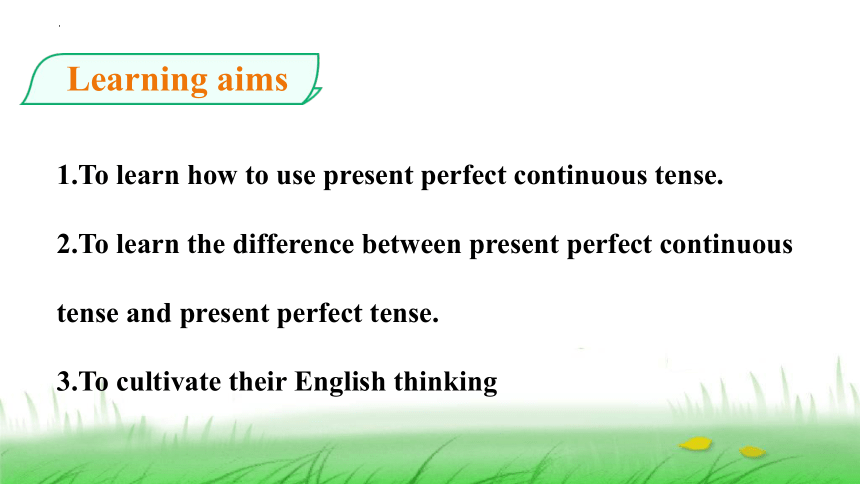
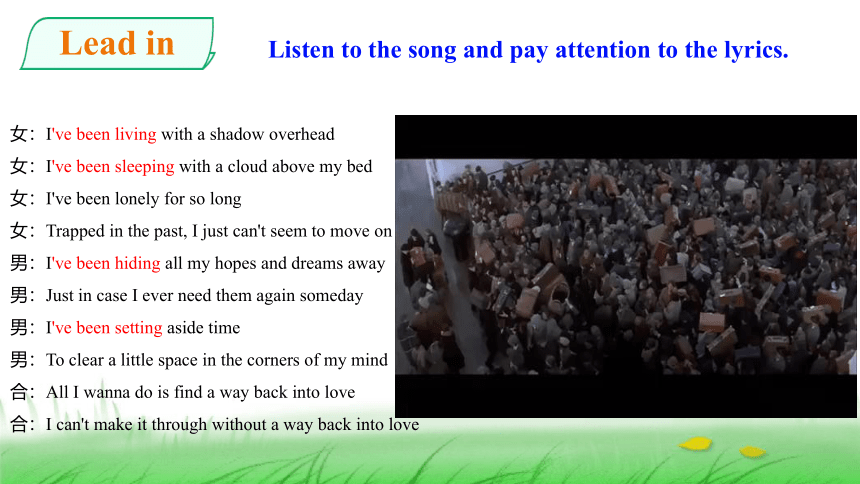
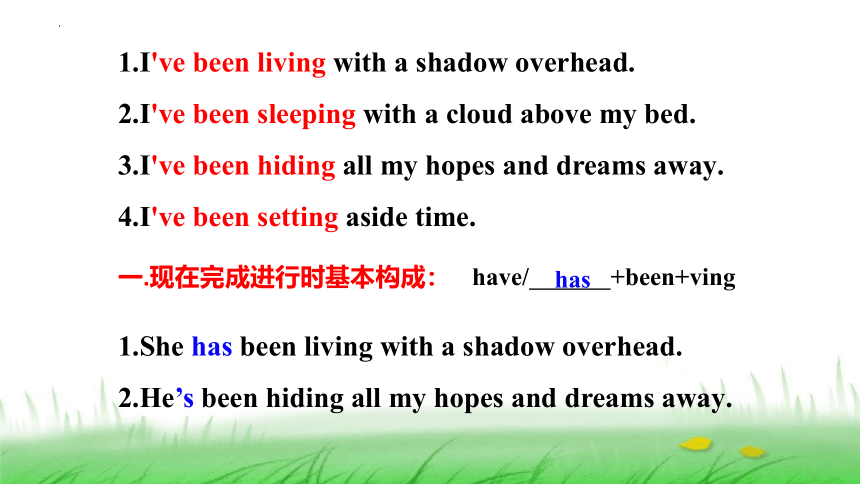
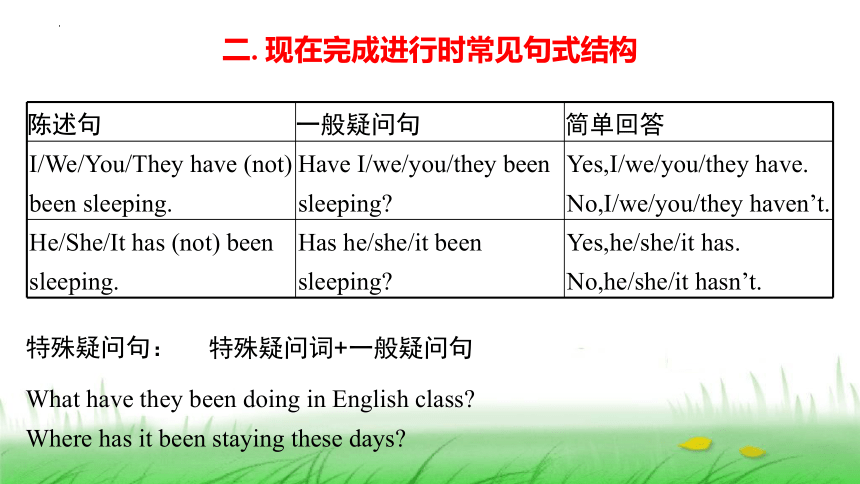
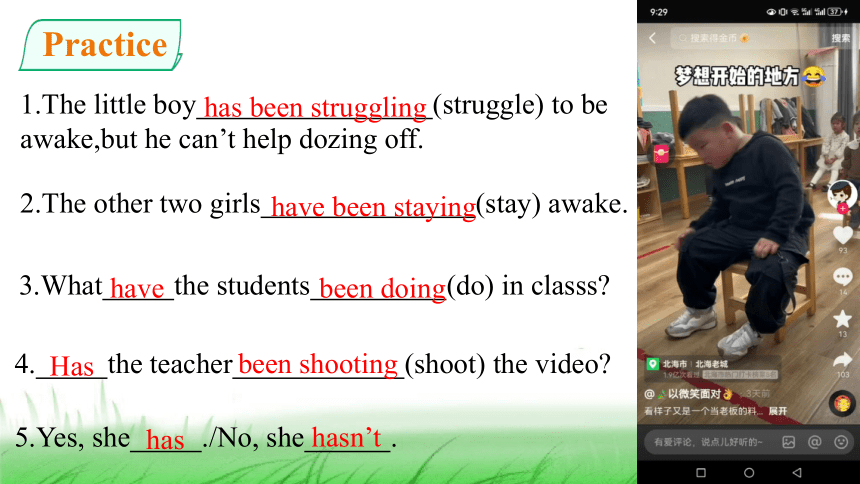
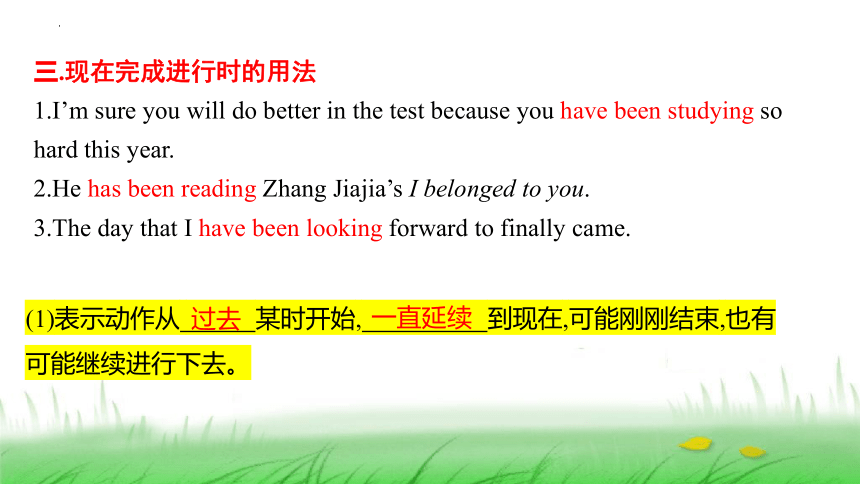
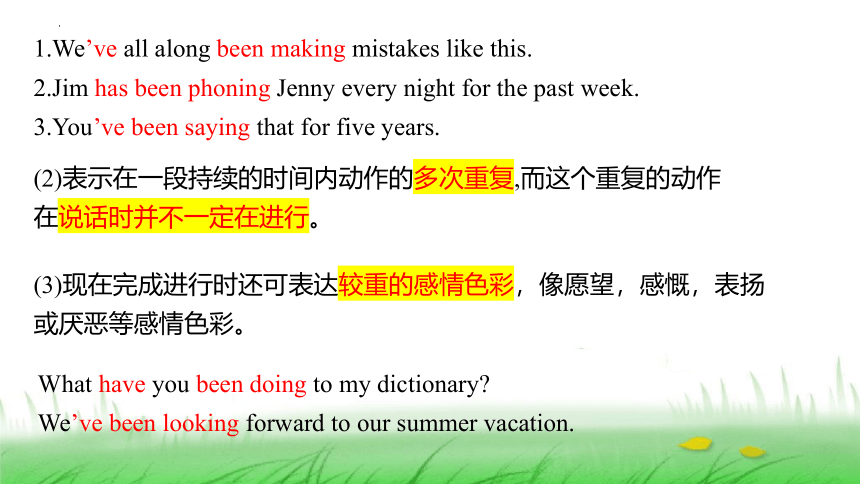
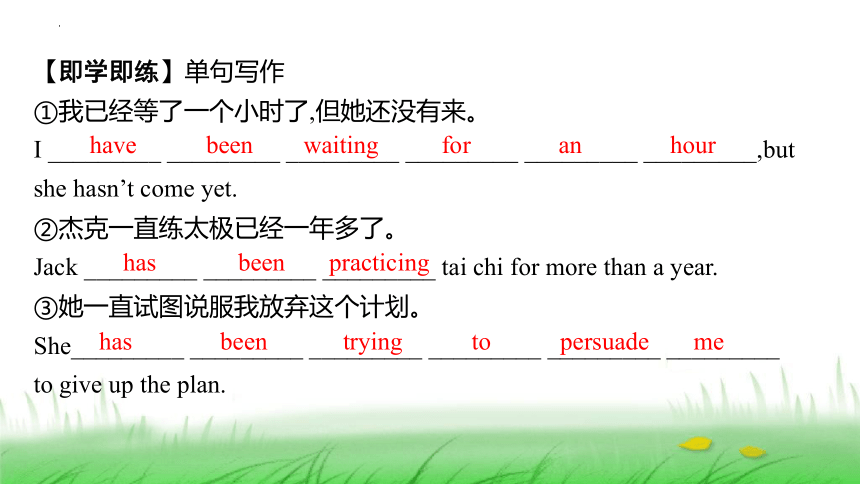
文档简介
(共20张PPT)
Unit 4 Adversity and courage
Period 3
(Discovering useful structures)
现在完成进行时
1.To learn how to use present perfect continuous tense.
2.To learn the difference between present perfect continuous tense and present perfect tense.
3.To cultivate their English thinking
Learning aims
Lead in
Listen to the song and pay attention to the lyrics.
女:I've been living with a shadow overhead
女:I've been sleeping with a cloud above my bed
女:I've been lonely for so long
女:Trapped in the past, I just can't seem to move on
男:I've been hiding all my hopes and dreams away
男:Just in case I ever need them again someday
男:I've been setting aside time
男:To clear a little space in the corners of my mind
合:All I wanna do is find a way back into love
合:I can't make it through without a way back into love
1.I've been living with a shadow overhead.
2.I've been sleeping with a cloud above my bed.
3.I've been hiding all my hopes and dreams away.
4.I've been setting aside time.
一.现在完成进行时基本构成:
have/ +been+ving
has
1.She has been living with a shadow overhead.
2.He’s been hiding all my hopes and dreams away.
二. 现在完成进行时常见句式结构
陈述句 一般疑问句 简单回答
I/We/You/They have (not) been sleeping. Have I/we/you/they been sleeping Yes,I/we/you/they have.
No,I/we/you/they haven’t.
He/She/It has (not) been sleeping. Has he/she/it been sleeping Yes,he/she/it has.
No,he/she/it hasn’t.
特殊疑问句:
特殊疑问词+一般疑问句
What have they been doing in English class
Where has it been staying these days
1.The little boy (struggle) to be awake,but he can’t help dozing off.
has been struggling
2.The other two girls (stay) awake.
have been staying
3.What the students (do) in classs
have
been doing
4. the teacher (shoot) the video
Has
been shooting
5.Yes, she ./No, she .
has
hasn’t
Practice
三.现在完成进行时的用法
1.I’m sure you will do better in the test because you have been studying so hard this year.
2.He has been reading Zhang Jiajia’s I belonged to you.
3.The day that I have been looking forward to finally came.
(1)表示动作从 某时开始, 到现在,可能刚刚结束,也有可能继续进行下去。
过去
一直延续
1.We’ve all along been making mistakes like this.
2.Jim has been phoning Jenny every night for the past week.
3.You’ve been saying that for five years.
(2)表示在一段持续的时间内动作的多次重复,而这个重复的动作在说话时并不一定在进行。
(3)现在完成进行时还可表达较重的感彩,像愿望,感慨,表扬或厌恶等感彩。
What have you been doing to my dictionary
We’ve been looking forward to our summer vacation.
【即学即练】单句写作
①我已经等了一个小时了,但她还没有来。
I _________ _________ _________ _________ _________ _________,but she hasn’t come yet.
②杰克一直练太极已经一年多了。
Jack _________ _________ _________ tai chi for more than a year.
③她一直试图说服我放弃这个计划。
She_________ _________ _________ _________ _________ _________ to give up the plan.
have been waiting for an hour
has been practicing
has been trying to persuade me
四.与现在完成进行时连用的时间状语
现在完成进行时的时间状语常见的有:
all day/month;this month/week/ year;these days;recently/lately;
in the past few+时间段; since+时间点; for+时间段等。
1.They have been building the bridge for two months.
2.They have been planting trees this month.
3.Vera has been trying to learn Chinese for years.
【即学即练】单句语法填空
①Tom (work) in the library every night over the last three months.
②—What bad weather!I am sick of it here.
—So am I.It (rain) since last Friday.Wish we could see the sun tomorrow.
③I wonder if John has forgotten my number.I (expect) him to call me for the past two hours.
has been working
has been raining
have been expecting
五.现在完成进行时与现在完成时的区别
He has changed his idea. He has been changing his idea.
I have already read the book. I have been reading the book.
(1)现在完成时强调动作的 ,而现在完成进行时强调动作的 。
完成
延续
(2)现在完成进行时往往表示动作在 ,而现在完成时不表示动作的重复,更强调 。即:现在完成进行时可表 事件,现在完成时经常表 事件。
重复
次数
重复
单个
1.Julia has been going to the library for a year.
2.Julia has gone to the library.
3.I've been taking part in races for four years.
4.How many races have you taken part in
1.Recently Mary has been doing sports regularly.
2. Recently Mary has done her sports regularly.
(3)现在完成进行时与所有进行时态一样带有感彩,可使表达显得生动,而现在完成时往往只表明一个事实、一种影响或结果,不带感彩。
【即学即练】单句写作
①汤姆的手很脏。他一直在修车。
Tom’s hands are very dirty.He _________ _________ _________ the car.
②这辆车现在又可以行驶了。汤姆已经把它修好了。
The car is going again now.Tom _________ _________it.
③我一直在写一本书。
I _________ _________ _________ a book.
④我已经写了一本书。
I _________ _________ a book.
have been repairing
has repaired
have been writing
have written
某些不具延续性含义的动词或静态动词,如come, go,marry, die, finish,leave,know,last等,不适用于现在完成进行时,但可用于现在完成时。
We have finished the homework.
We have been finishing the homework.
注意
I’ve known him for many years.
The war has lasted for a long time.
1.It (rain) almost every day in March.
2.So far this week they (watch)the film three times.
3.She (drink) six glasses of beer tonight.
4.Now that he is out of work,Luke (consider) going abroad,but he (decide) yet.
5.He is the most creative boy that I (know).
6.All these years we (try) to get in touch with her.
has been raining
have watched
has drunk
has been considering
have known
have been trying
hasn’t decided
Practice
狗一直犬吠了大约两个小时。
史蒂夫自八岁以来都打棒球。
The little girl has been crying for half an hour.
I have been trying to phone you this morning.
The dog has been barking for about two hours.
Steve has been playing baseball since the age of eight.
这个小女孩哭了半个小时。
我今天早上一直试图给你打电话。
Translation
Homework
1.Review the grammar points.
2.Finish the exercise.
Thank you!
Unit 4 Adversity and courage
Period 3
(Discovering useful structures)
现在完成进行时
1.To learn how to use present perfect continuous tense.
2.To learn the difference between present perfect continuous tense and present perfect tense.
3.To cultivate their English thinking
Learning aims
Lead in
Listen to the song and pay attention to the lyrics.
女:I've been living with a shadow overhead
女:I've been sleeping with a cloud above my bed
女:I've been lonely for so long
女:Trapped in the past, I just can't seem to move on
男:I've been hiding all my hopes and dreams away
男:Just in case I ever need them again someday
男:I've been setting aside time
男:To clear a little space in the corners of my mind
合:All I wanna do is find a way back into love
合:I can't make it through without a way back into love
1.I've been living with a shadow overhead.
2.I've been sleeping with a cloud above my bed.
3.I've been hiding all my hopes and dreams away.
4.I've been setting aside time.
一.现在完成进行时基本构成:
have/ +been+ving
has
1.She has been living with a shadow overhead.
2.He’s been hiding all my hopes and dreams away.
二. 现在完成进行时常见句式结构
陈述句 一般疑问句 简单回答
I/We/You/They have (not) been sleeping. Have I/we/you/they been sleeping Yes,I/we/you/they have.
No,I/we/you/they haven’t.
He/She/It has (not) been sleeping. Has he/she/it been sleeping Yes,he/she/it has.
No,he/she/it hasn’t.
特殊疑问句:
特殊疑问词+一般疑问句
What have they been doing in English class
Where has it been staying these days
1.The little boy (struggle) to be awake,but he can’t help dozing off.
has been struggling
2.The other two girls (stay) awake.
have been staying
3.What the students (do) in classs
have
been doing
4. the teacher (shoot) the video
Has
been shooting
5.Yes, she ./No, she .
has
hasn’t
Practice
三.现在完成进行时的用法
1.I’m sure you will do better in the test because you have been studying so hard this year.
2.He has been reading Zhang Jiajia’s I belonged to you.
3.The day that I have been looking forward to finally came.
(1)表示动作从 某时开始, 到现在,可能刚刚结束,也有可能继续进行下去。
过去
一直延续
1.We’ve all along been making mistakes like this.
2.Jim has been phoning Jenny every night for the past week.
3.You’ve been saying that for five years.
(2)表示在一段持续的时间内动作的多次重复,而这个重复的动作在说话时并不一定在进行。
(3)现在完成进行时还可表达较重的感彩,像愿望,感慨,表扬或厌恶等感彩。
What have you been doing to my dictionary
We’ve been looking forward to our summer vacation.
【即学即练】单句写作
①我已经等了一个小时了,但她还没有来。
I _________ _________ _________ _________ _________ _________,but she hasn’t come yet.
②杰克一直练太极已经一年多了。
Jack _________ _________ _________ tai chi for more than a year.
③她一直试图说服我放弃这个计划。
She_________ _________ _________ _________ _________ _________ to give up the plan.
have been waiting for an hour
has been practicing
has been trying to persuade me
四.与现在完成进行时连用的时间状语
现在完成进行时的时间状语常见的有:
all day/month;this month/week/ year;these days;recently/lately;
in the past few+时间段; since+时间点; for+时间段等。
1.They have been building the bridge for two months.
2.They have been planting trees this month.
3.Vera has been trying to learn Chinese for years.
【即学即练】单句语法填空
①Tom (work) in the library every night over the last three months.
②—What bad weather!I am sick of it here.
—So am I.It (rain) since last Friday.Wish we could see the sun tomorrow.
③I wonder if John has forgotten my number.I (expect) him to call me for the past two hours.
has been working
has been raining
have been expecting
五.现在完成进行时与现在完成时的区别
He has changed his idea. He has been changing his idea.
I have already read the book. I have been reading the book.
(1)现在完成时强调动作的 ,而现在完成进行时强调动作的 。
完成
延续
(2)现在完成进行时往往表示动作在 ,而现在完成时不表示动作的重复,更强调 。即:现在完成进行时可表 事件,现在完成时经常表 事件。
重复
次数
重复
单个
1.Julia has been going to the library for a year.
2.Julia has gone to the library.
3.I've been taking part in races for four years.
4.How many races have you taken part in
1.Recently Mary has been doing sports regularly.
2. Recently Mary has done her sports regularly.
(3)现在完成进行时与所有进行时态一样带有感彩,可使表达显得生动,而现在完成时往往只表明一个事实、一种影响或结果,不带感彩。
【即学即练】单句写作
①汤姆的手很脏。他一直在修车。
Tom’s hands are very dirty.He _________ _________ _________ the car.
②这辆车现在又可以行驶了。汤姆已经把它修好了。
The car is going again now.Tom _________ _________it.
③我一直在写一本书。
I _________ _________ _________ a book.
④我已经写了一本书。
I _________ _________ a book.
have been repairing
has repaired
have been writing
have written
某些不具延续性含义的动词或静态动词,如come, go,marry, die, finish,leave,know,last等,不适用于现在完成进行时,但可用于现在完成时。
We have finished the homework.
We have been finishing the homework.
注意
I’ve known him for many years.
The war has lasted for a long time.
1.It (rain) almost every day in March.
2.So far this week they (watch)the film three times.
3.She (drink) six glasses of beer tonight.
4.Now that he is out of work,Luke (consider) going abroad,but he (decide) yet.
5.He is the most creative boy that I (know).
6.All these years we (try) to get in touch with her.
has been raining
have watched
has drunk
has been considering
have known
have been trying
hasn’t decided
Practice
狗一直犬吠了大约两个小时。
史蒂夫自八岁以来都打棒球。
The little girl has been crying for half an hour.
I have been trying to phone you this morning.
The dog has been barking for about two hours.
Steve has been playing baseball since the age of eight.
这个小女孩哭了半个小时。
我今天早上一直试图给你打电话。
Translation
Homework
1.Review the grammar points.
2.Finish the exercise.
Thank you!
